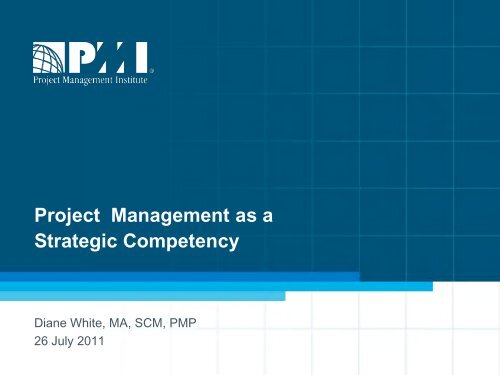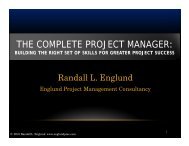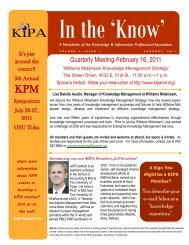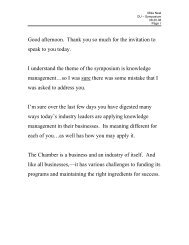Project Management as a Strategic Competency - Knowledge ...
Project Management as a Strategic Competency - Knowledge ...
Project Management as a Strategic Competency - Knowledge ...
- No tags were found...
You also want an ePaper? Increase the reach of your titles
YUMPU automatically turns print PDFs into web optimized ePapers that Google loves.
<strong>Project</strong> <strong>Management</strong> <strong>as</strong> a<br />
<strong>Strategic</strong> <strong>Competency</strong><br />
Diane White, MA, SCM, PMP<br />
26 July 2011
Your <strong>Project</strong> Portfolio is Your Strategy<br />
“The most important – indeed, the only – actions and<br />
activities that serve to execute strategy are the projects<br />
and programs that will bring the organization from its<br />
current state to its desired future state…<br />
If the project portfolio becomes disengaged from<br />
strategy a lethal disconnect is created. Actions do not<br />
align with one another or with strategic visions and<br />
intentions, and the strategy h<strong>as</strong> no hope of execution.”<br />
Executing Your Strategy<br />
Mark Morgan, Raymond E. Levitt, William A. Malek, 2007
The Modern Organization<br />
In the 20 th century, organizations grew larger than ever<br />
They exploited new technologies and economies of scale<br />
Standardized job descriptions<br />
Repetitive, optimized operations<br />
Functional<br />
organization
The Modern Organization<br />
Corporations led the way,<br />
building hierarchies of departments<br />
• Production<br />
• Marketing<br />
• R&D<br />
• Human resources<br />
• etc.<br />
In a pattern that could expand…
The Modern Organization<br />
Almost without limit<br />
— but there w<strong>as</strong> a price.<br />
• Decision authority w<strong>as</strong> too far from execution<br />
• Responsibility w<strong>as</strong> diffused<br />
• Communications were stretched thin<br />
• “Silo” organizations found it hard to execute what w<strong>as</strong> new:<br />
– Developing new products or technologies<br />
– Implementing new business processes<br />
– Seizing new market opportunities<br />
– Carrying out strategic change<br />
• Just starting a project and <strong>as</strong>signing one of many managers to<br />
it rarely leads to effective project management<br />
• <strong>Project</strong> management is a unique discipline of its own
<strong>Project</strong> <strong>Management</strong>: Roots<br />
• Focused on execution<br />
• Long established in “projectized” fields<br />
– Construction & heavy engineering<br />
– Chemical, oil, other process industries<br />
– Transport, pipelines, communications<br />
• Teams formed and dissolved for projects<br />
– Need for shared framework for cost<br />
estimation and scheduling<br />
• As cost and complexity incre<strong>as</strong>ed, formal<br />
methods evolved<br />
– Too much for anyone to “keep in his<br />
head” or “learn on the job”
<strong>Project</strong> <strong>Management</strong>: Growth<br />
• New techniques from<br />
– Operations research<br />
– Cold War defense projects<br />
– 1960s space race<br />
• Information technology both served<br />
project management…<br />
– Software for critical path & network<br />
analysis, PERT, etc.<br />
• And drove project management<br />
– As IT transformed business, it became a<br />
major field for project management itself
The Challenge<br />
Can a large organization bring its strategy and<br />
resources to bear…<br />
To get new results with defined scope, cost and<br />
schedule…<br />
From ad hoc groups without standardized t<strong>as</strong>ks and<br />
job descriptions<br />
Can a large organization recapture the common<br />
purpose, performance, and accountability of a small<br />
team
<strong>Project</strong> <strong>Management</strong><br />
• Identify requirements<br />
• Establish clear objectives<br />
• Balance demands for scope, time, cost, quality<br />
• Align with concerns and expectations of stakeholders<br />
• Execute<br />
(Isn’t that obvious)<br />
(Is it)
<strong>Strategic</strong> in the Global Economy<br />
• More than $13 trillion per year – 20% of gross<br />
global product – is spent on fixed capital projects<br />
• Trillions more go into projects in IT, new product<br />
and service development, other knowledge work<br />
• 20 million people worldwide work on project teams<br />
full-time or part-time
<strong>Strategic</strong> in the Global Economy<br />
Incre<strong>as</strong>ing Demand Even in a Downturn<br />
• The “war for talent”<br />
– Retirement of baby boom generation<br />
– Incoming workforce is smaller, more demanding<br />
• Pressure for corporate social responsibility<br />
(CSR) and sustainability<br />
– Greater accountability and transparency
<strong>Strategic</strong> for Organizations<br />
• 600 executives worldwide surveyed by Economist Information Unit<br />
• “What skill is most important in your staff”<br />
– <strong>Project</strong> execution<br />
• “What capability does your organization most need”<br />
– The ability to implement strategic change<br />
• Two ways of saying the same thing<br />
– <strong>Strategic</strong> change is implemented through projects
<strong>Strategic</strong> for Execution<br />
• Dall<strong>as</strong> Cowboys New Stadium<br />
• 105,000 seats for NFL games<br />
• >3 million sq. ft. of finished area<br />
• World’s largest freestanding roof and<br />
video display panels
PMI <strong>Project</strong> of the Year 2010
<strong>Strategic</strong> for Organizations<br />
• 80% of higher-performing projects use a<br />
certified project manager<br />
• 50% of project failure is traced to poor (or<br />
no) project management:<br />
– Bad estimates/deadlines<br />
– Scope changes<br />
– Poor resource planning<br />
• Larger & more complex organizations<br />
extend project management to program<br />
and portfolio management<br />
PriceWaterhouseCoopers survey, 2007
<strong>Strategic</strong> for Tulsa’s Growth<br />
The Arco Building
<strong>Strategic</strong> for Organizations<br />
High Performers<br />
• 70% have mature project and portfolio management practices in place<br />
• 50% use standardized project management practices throughout the<br />
organization<br />
• 72% have a formal process for developing project manager competency<br />
• 44% have over one-third of their project managers PMP® credentialed<br />
• 88% use risk management techniques always or often<br />
• 85% always track, or often track, project performance me<strong>as</strong>ures<br />
92% of projects meet their orgiginal goals and business intent<br />
Put an average of $40,000 at risk for every $1 million spent on projects
<strong>Strategic</strong> for Public Agencies<br />
• Everyone involved in strategic planning<br />
• Goals aligned<br />
• Goals connected with both professional<br />
and project development<br />
18
<strong>Strategic</strong> for Careers, Too<br />
$105,000<br />
PMPs<br />
Median Salary<br />
$100,000<br />
$95,000<br />
$90,000<br />
Non-PMPs<br />
$85,000<br />
$80,000<br />
3 4 5 6 7 8 9 10 11 12 13 14 15<br />
Years of PM experience
PMI Growth Since 1969<br />
353,326<br />
(May 2011)<br />
20
The <strong>Project</strong> <strong>Management</strong> Institute<br />
• Founded by working project managers to share<br />
experience and best practices<br />
• Not for profit, volunteer-driven<br />
• Advance the profession<br />
– Collaborative communities<br />
– Conducting and publishing academic research<br />
• Develop and update standards
Globally Recognized Standards
PMI Family of Credentials<br />
• Certified Associate in <strong>Project</strong> <strong>Management</strong> (CAPM ® )<br />
• Scheduling Professional (PMI-SP ® )<br />
• Risk <strong>Management</strong> Professional (PMI-RMP ® )<br />
• <strong>Project</strong> <strong>Management</strong> Professional (PMP ® )<br />
• Program <strong>Management</strong> Professional (PgMP ® )<br />
• Agile Certified Practitioner (PMI-ACP SM )
Summary<br />
• <strong>Project</strong> management is a strategic<br />
competency for<br />
– Results, performance, accountability<br />
– Execution of new efforts and strategic change<br />
– Multi-functional and multi-location teams<br />
– Transfer of new knowledge to operations<br />
• And one of the most challenging, rewarding<br />
careers in the world!
Thank You<br />
Questions<br />
www.pmi.org<br />
© 2011 <strong>Project</strong> <strong>Management</strong> Institute







